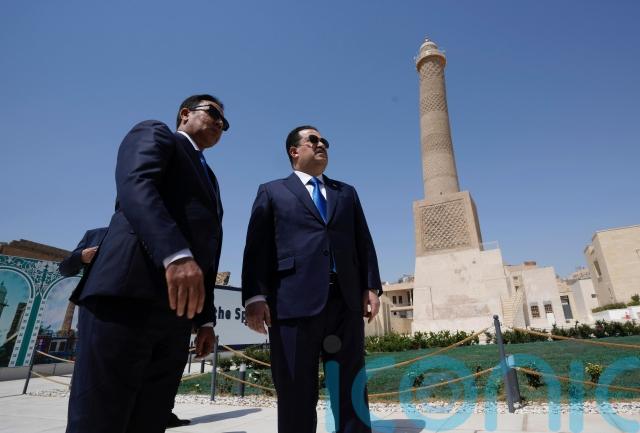
Iraq’s prime minister has presided over the official reopening of the historic al-Nuri Grand Mosque and its leaning minaret in the heart of Mosul’s Old City, eight years after it was destroyed by militants from the Islamic State group.
For some 850 years, the leaning minaret of the mosque stood as a famous landmark. In 2014, IS leader Abu Bakr al-Baghdadi declared the so-called “caliphate” there by delivering a Friday sermon and leading prayers.
The militant group later destroyed the mosque by detonating explosives inside the structures as it faced defeat in a battle with Iraqi military forces for control of the city in 2017.

Unesco – the UN’s scientific, educational and cultural organisation – worked alongside Iraqi heritage and Sunni religious authorities to reconstruct the minaret using traditional techniques and materials salvaged from the rubble.
Unesco raised 115 million dollars for the reconstruction project, with large shares coming from the United Arab Emirates and the European Union.
Prime minister Mohammed Shia al-Sudani said in a statement that the reconstruction of the mosque “will remain a milestone, reminding all enemies of the heroism of Iraqis, their defence of their land, and their rebuilding of everything destroyed by those who want to obscure the truth”.
“We will continue our support for culture, and efforts to highlight Iraqi antiquities, as a social necessity, a gateway to our country for the world, an opportunity for sustainable development, and a space for youth to innovate,” he said.
At its peak, IS ruled an area half the size of the United Kingdom in Iraq and Syria and was notorious for its brutality.
It beheaded civilians and enslaved and raped thousands of women from the Yazidi community, one of Iraq’s oldest religious minorities.
In addition to the mosque, war-damaged churches were rebuilt as part of the reconstruction project, aiming to preserve the heritage of the city’s shrinking Christian population.
Mr Sudani said the city of Mosul embraces all of its communities and “embodies all the characteristics of Iraq’s diverse society”.
UN investigators have said that IS militants committed war crimes against Christians in Iraq, including seizing their property, engaging in sexual violence, enslavement, forced conversions and destruction of cultural and religious sites.
Most of Mosul’s small population of Christians fled when IS launched its offensive in 2014.
In 2003, Mosul’s Christian population stood at around 50,000. Today, fewer than 20 Christian families remain as permanent residents in the city, although some who resettled in the semi-autonomous Kurdish area of northern Iraq still return to Mosul for church services.
The reconstruction project in Mosul could serve as a model for restoring other cultural sites in war-torn areas — including neighbouring Syria, which is starting to emerge from nearly 14 years of civil war after the fall of former president Bashar Assad last year.
Subscribe or register today to discover more from DonegalLive.ie
Buy the e-paper of the Donegal Democrat, Donegal People's Press, Donegal Post and Inish Times here for instant access to Donegal's premier news titles.
Keep up with the latest news from Donegal with our daily newsletter featuring the most important stories of the day delivered to your inbox every evening at 5pm.